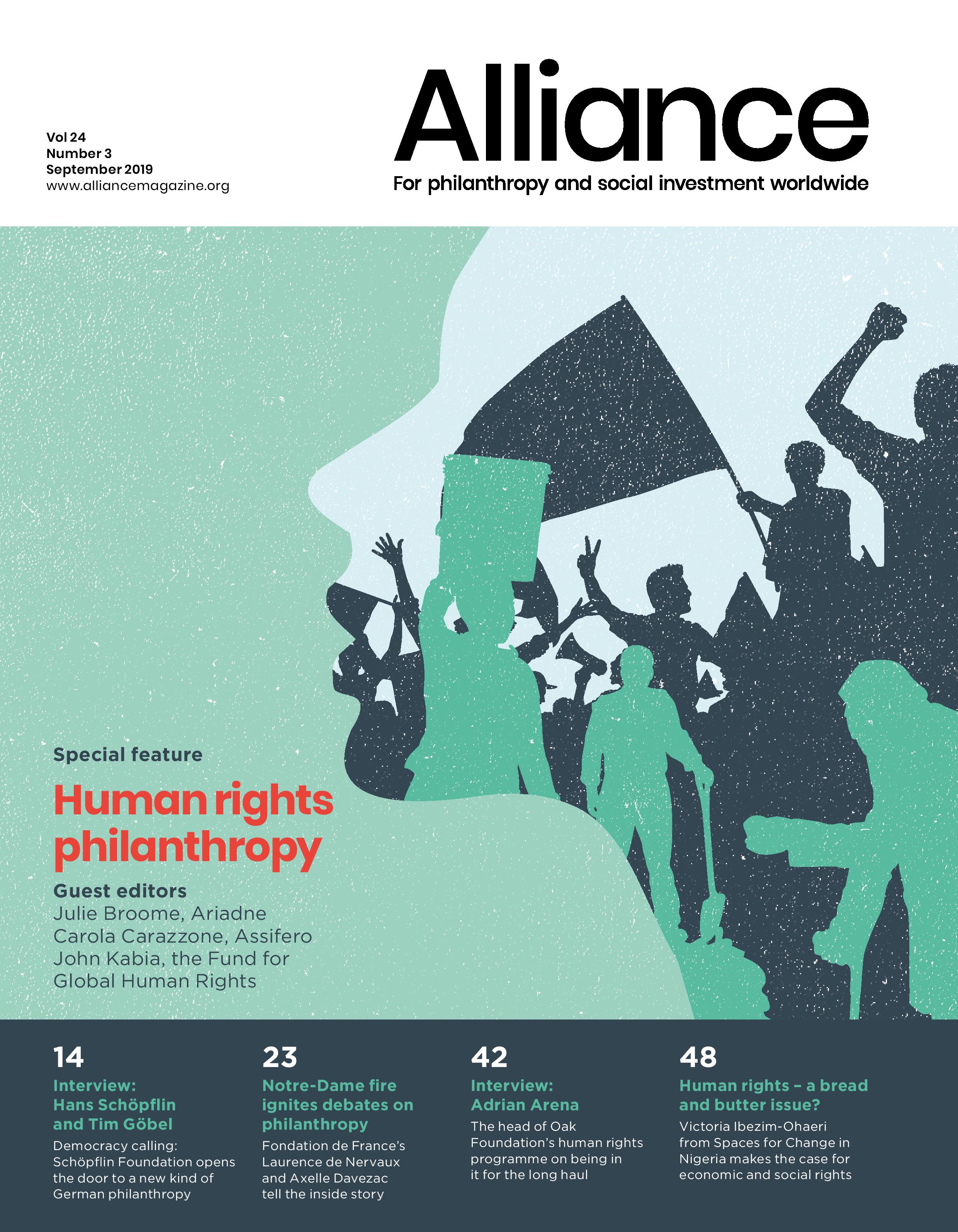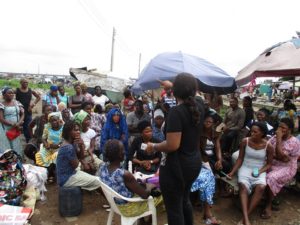Economic human rights need to take centre stage before civil and political rights can be truly meaningful for the millions of people living in dire poverty
Article 4 of the African Charter on Human and Peoples’ Rights (widely known as the Banjul Charter), states: ‘Human beings are inviolable. Every human being shall be entitled to respect for his life and the integrity of his person. No one may be arbitrarily deprived of this right.’
Is this guarantee meaningful to a person lacking access to adequate healthcare and livelihood? Does the right to free speech mean much to somebody that is too hungry and too weak to speak? And of what use is the right to privacy and human dignity (integrity) to a homeless slum dweller who is repeatedly evicted from their shack without being provided with alternative shelter? These are the sort of questions Spaces for Change|S4C often contends with at the community outreaches, town halls and legal clinics it organises in rural communities and urban slums across Nigeria.
In spite of the numerous setbacks, human rights advocates and organisations are not relenting in the fight for greater legal recognition and protection of ESC rights.
According to World Bank and UN estimates, over 700 million people live below the international poverty line of $1.90. The majority of these live in rural areas, are poorly educated and under 18 years of age. Both the rural localities and the urban slums where they live are characterised by squalid living conditions and other forms of deprivations caused by decades of governmental failure to provide basic amenities. The people who live here are not oblivious to their human rights. To them, nothing is more bewildering than the huge disconnect between the constitutional bestowal of human rights and their realities of want, disease and suffering. ‘What do we do with these human rights without bread and butter? What will human rights do for an empty stomach?’ they often ask.
Civil and political rights take priority
In principle, all human rights, civil and political (C&P), economic, social and cultural (ESC) rights, are indivisible and interdependent. In practice, however, the relationship between the two sets of rights is lopsided, with C&P rights taking precedence. Fuelling this imbalance is the segregation of C&P rights and ESC rights into two separate international covenants based on Cold War-related ideological wrangles. The partitioning of C&P rights and ESC rights at the international sphere has trickled down to national constitutions where C&P rights are recognised as fundamental rights, with special procedures laid down for their immediate enforcement.
In contrast, ESC rights are to be progressively realised and, as such, construed as fundamental objectives and directive principles of state policy. Their potency is further undermined by certain clauses precluding national courts from determining legal claims arising from the state’s inability to meet its social and economic obligations, and the absence of a dedicated enforcement procedure. These factors have prevented many rights-based platforms from challenging and demanding justice for the worsening social and economic conditions to which they are subject.
Moreover, human rights have been too narrowly and conservatively interpreted across jurisdictions, including Nigeria, with the courts often refraining from extending the scope of human rights so that social and economic violations resulting from disease, poverty or malnutrition would constitute actionable claims. Concerns have also been raised about the ability of the courts to enforce ESC rights without breaching the doctrine of separation of powers. The argument is that this would allow courts to determine matters that have budget and policy implications which fall within the realm of executive powers.
Human rights can only have serious meaning to citizens when they can be enforced, claimed and asserted under both municipal and international law.
As the disparity between ESC rights policy and practice persists, the inequality between rich and poor communities increases. States are brazenly escaping accountability despite glaring failures to establish support-based programmes, processes and mechanisms for enhancing access of poor and low-income groups to social and economic opportunities or enabling them to secure legal remedies for such deprivations. For instance, a recent report found that over three million people were affected by some element of forced displacement from 2010 to 2016 in Nigeria. Sixteen of these were reported dead and up to 323,031 properties (houses, stalls/stores, land, etc) were either demolished or confiscated. In all these instances, the dwellings of the poor have been flattened in the name of urban development, and their livelihoods swept away overnight without due compensation by the authorities. Access to quality legal representation to challenge these human rights violations remains beyond the reach of the affected populations.
Donors reinforcing an unhelpful dichotomy
Donors and charities across the world have taken bold steps to fill this accountability gap across jurisdictions through their support for various initiatives that tackle homelessness, illiteracy, infant and maternal mortality, hunger, poverty, access to justice etc. However, gaps remain. Donor-led initiatives have predominantly followed the long-standing tradition separating human rights into two categories, which make C&P rights pre-eminent.
Some other initiatives specifically targeting socially vulnerable groups overlook the human rights paradigm. Instead, they frame their interventions around the objectives of ‘compassion’, ‘development’ and ‘service delivery’. Not only that, the world is also witnessing the exponential expansion of C&P rights without ESC rights receiving commensurate attention. This sends a signal that ESC rights may remain subordinate for a long time. Concentrating resources on C&P rights not only reinforces the perception that social and economic deprivations are not actionable human rights violations, but also explains why millions of dollars’ worth of investments and development aid have not produced a significant decline in poverty levels.
Human rights lose meaning for rights-holders dwelling in poverty, want and inequality. It is, however, not too late to break barriers and change the narrative from gloom to bloom.
In spite of the numerous setbacks, human rights advocates and organisations are not relenting in the fight for greater legal recognition and protection of ESC rights. At Spaces for Change, we use strategic litigation to influence the development of progressive jurisprudence on socio-economic rights in Nigeria. The litigation strategy is supported by sustained advocacy for legal reform with the aim of prompting the policy and legislative shifts needed to accelerate the implementation of ESC rights in the country.
Our push for greater judicial recognition of ESC rights and legal reform is based on the premise that it is not enough for social and economic rights provisions to be contained in constitutional documents and nothing more. Rather, human rights can only have serious meaning to citizens when they can be enforced, claimed and asserted under both municipal and international law. The result of the seven year-long effort is the growing judicial departure from the rigid and conservative notions that ESC rights are not enforceable in law. This departure is in line with the evolving legal and human rights culture that sees these rights being enforced even in jurisdictions where they are weakly protected as directive principles of state policy.
Human rights lose meaning for rights-holders dwelling in poverty, want and inequality. It is, however, not too late to break barriers and change the narrative from gloom to bloom. Change beckons when human rights rhetoric is matched with effective solutions to human needs. Change beckons when governments adopt deliberate and concrete steps, including legislative measures to recognise ESC rights as actionable rights that require serious and responsible observance. Change beckons when funders and donor bodies redirect and target their support towards initiatives at the intersection of C& P and ESC rights.
With the cooperation and support of both governments and funders, human rights advocates and organisations will have the means and support they need to access essential national, regional and international accountability mechanisms through which they can seek redress for social and economic transgressions. As the journey to human rights and freedoms continues, all hands must be on deck.
Victoria Ibezim-Ohaeri is executive director of Spaces for Change.
Email: victoria@spacesforchange.org
Twitter: @VictoriaOhaeri









Comments (0)